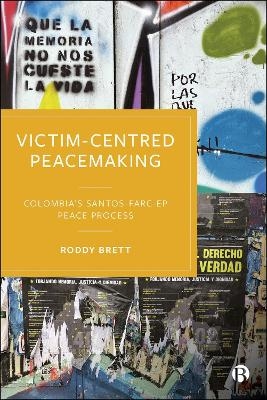
Victim-Centred Peacemaking
Colombia’s Santos–FARC-EP Peace Process
Seiten
2024
Bristol University Press (Verlag)
978-1-5292-3880-8 (ISBN)
Bristol University Press (Verlag)
978-1-5292-3880-8 (ISBN)
This book explores how survivors of political violence in Colombia have asserted themselves and challenged those in power. Drawing on interviews and various academic disciplines, the book proposes a victim-centered approach to transitional justice, valuable for both researchers and practitioners.
Based on unique empirical research into Colombia’s Santos-FARC-EP peace process (2012-2016), this book interrogates how, if at all, survivors and victims may assert agency and contribute to formal peacemaking and transitional justice initiatives.
The book argues that victim inclusion meaningfully transformed victim-perpetrator relations and dynamics in Havana, while partially shaping the content of both the Victims’ Agreement and Final Agreement. As such, the delegations created paths for empowerment at the individual and, in part, collective levels. However, victim inclusion also precipitated experiences of victim depoliticization, revictimization, retraumatization and instrumentalization.
Drawing on insights from across academic disciplines, the book proposes an instrumentalization / empowerment spectrum to analyse the complex impact of victim-centred approaches to peacemaking/transitional justice, and is valuable for both researchers and practitioners.
Based on unique empirical research into Colombia’s Santos-FARC-EP peace process (2012-2016), this book interrogates how, if at all, survivors and victims may assert agency and contribute to formal peacemaking and transitional justice initiatives.
The book argues that victim inclusion meaningfully transformed victim-perpetrator relations and dynamics in Havana, while partially shaping the content of both the Victims’ Agreement and Final Agreement. As such, the delegations created paths for empowerment at the individual and, in part, collective levels. However, victim inclusion also precipitated experiences of victim depoliticization, revictimization, retraumatization and instrumentalization.
Drawing on insights from across academic disciplines, the book proposes an instrumentalization / empowerment spectrum to analyse the complex impact of victim-centred approaches to peacemaking/transitional justice, and is valuable for both researchers and practitioners.
Roddy Brett is a Professor of Peace and Conflict Studies at the University of Bristol and directs the Global Insecurities Centre.
Introduction
1. A Concise History of Violence
2. Colombia’s Aberrational Cold War
3. Getting to Havana: From International Pariah to Innovative Peacemaking
4. The Havana Talks: A Victim-Centred Peace?
5. A Participatory Process? Victim Inclusion and Representation in Havana
6. Victims As Peacebuilders: The Relational Impact of the Victims’ Delegations
7. The Impact of the Victims’ Delegations: Victims As Peacemakers
Conclusions
Annex 1: Interview Format
Annex 2: Participation in the Victims’ Delegations
| Erscheinungsdatum | 30.11.2024 |
|---|---|
| Zusatzinfo | 2 Tables, black and white |
| Sprache | englisch |
| Maße | 156 x 234 mm |
| Themenwelt | Sozialwissenschaften ► Politik / Verwaltung ► Europäische / Internationale Politik |
| ISBN-10 | 1-5292-3880-3 / 1529238803 |
| ISBN-13 | 978-1-5292-3880-8 / 9781529238808 |
| Zustand | Neuware |
| Informationen gemäß Produktsicherheitsverordnung (GPSR) | |
| Haben Sie eine Frage zum Produkt? |
Mehr entdecken
aus dem Bereich
aus dem Bereich
Studienbuch
Buch | Hardcover (2023)
De Gruyter Oldenbourg (Verlag)
44,95 €
Amerikas Strategie der Vorherrschaft und der Kampf um Eurasien
Buch | Softcover (2024)
NOMEN Verlag
20,00 €


